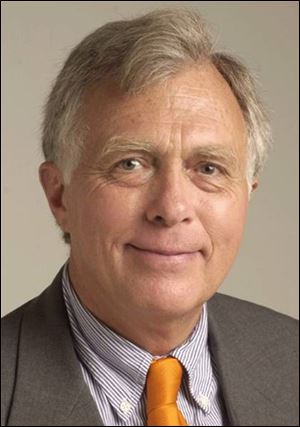
Oil exploitation issue has left Chad hanging
12/21/2005
Dan Simpson, a retired diplomat, is a member of the editorial boards of The Blade and Pittsburgh Post-Gazette.
WHEN the African nation of Chad, one of the poorest countries in the world, first discovered it had oil, there was a lot of thought in Africa and elsewhere as to how it could be exploited and what the impact of the wealth it would bring would be on the people of the country.
Chad is in the middle of Africa, almost entirely desert and thinly populated by tribes with a reputation for almost constant internecine warfare. I was U.S. ambassador in the neighboring Central African Republic, a country poor enough in itself, in the early 1990s.
Chadians came to the C.A.R. to work and, according to the Central Africans, to raid and steal (maybe yes, maybe no), because the C.A.R. was better off than Chad.
The only way landlocked Chad's petroleum could be exploited profitably was through the construction of a 663-mile underground pipeline across Cameroon to the port of Douala. That would cost an estimated $4.2 billion. No one wanted to put that kind of money into Chad in the pre-$50-a-barrel days without some kind of guarantee of security.
By 2000, the government of President Idriss Deby had been in power without significant challenge or mayhem for long enough - since 1990 - to make the investment thinkable.
The second major issue was - believe it or not - what the impact of the oil money would be on Chad and its 10 million people. There has been since the mid-20th century a certain amount of romanticism surrounding Chad. French author Romain Gary wrote a novel called The Roots of Heaven that was set in Chad. It was made into a movie. One element of the "heaven" aspect of Chad was the presence there of quite a few elephants - until the locals killed them off and ate them for food during their various wars.
One of those wars involved Libya and its Leader, Muammar Kaddafi, who had the idea of grabbing a northern piece of Chad called the Aouzou Strip. For years the CIA financed an anti-Kaddafi army based in Chad that helped the Chadians successfully resist the territorial ambitions of the Libyans.
What made the impact of oil on the Chadians an issue was the spectacle of the effect oil had on other African countries. The usual pattern was for an African country, perhaps with a diversified economy that included agriculture, herding, light industry, and some mining, to discover oil.
From that lubricious moment on, oil became all. Other enterprises were ignored or abandoned. Usually a small group of people, mostly from one tribe, seized control of the oil resources, built up sufficient armed forces, and then stiffed the rest of the population in terms of education, health care, infrastructure, and anything else worth having.
International oil companies, including U.S. oil companies, are generally complicit in this.
For me, the piece de resistance was Angola, from independence in 1975 until fairly recently. At one point, Cuban troops protected Angola's oil facilities, which were being worked by an American company, from a rebel movement, UNITA, which was financed and armed by the CIA and white South Africa as part of the Reagan administration's policy of sticking it to the Soviets and Cubans wherever that was possible. In Angola, in the meantime, the government, Marxist in name, resembling Louis XIV's Versailles in practice, ate all the oil money, leaving the population poverty-stricken.
So the idea was, how can Chad's oil be exploited without turning the country into a pigsty in terms of governance?
The answer, it was thought, was to nail the Chadian government of Idriss Deby into an agreement that it would receive the cash to build the pipeline and begin exploitation of the oil only after it agreed to split the oil receipts in an equitable fashion. Mr. Deby's government signed up and, in return, various lenders, including the World Bank, provided the wherewithal to put the project on the rails.
The oil money was supposed to be divided largely between poverty reduction projects, 72 percent, and 10 percent for a "future generations" fund, for when the oil ran out. The national and regional governments were supposed to get the other 18 percent. Production began in 2003 with a certain amount of ballyhoo and self-congratulation for the enlightened way the use of Chad's resources had been resolved.
Now, two years later, Mr. Deby says his government is bankrupt and that he needs a much larger cut of the oil revenues to spend on its general budget and, particularly, security - as in, juicy defense contracts to procure arms.
Chad borders on the Darfur region of Sudan and numerous Sudanese refugees have crossed the border to settle in camps in Chad. Last week, allegedly because of that, Chadian rebels - unpaid deserters from the Chadian army - attacked a village in an area near the border.
Conclusion: Security really is an issue; more oil money is needed to deal with it.
Bottom line: More oil money for Mr. Deby, his clan, and his government.
Goodbye, enlightened agreement.
Dan Simpson, a retired diplomat, is a member of the editorial boards of The Blade and Pittsburgh Post-Gazette.